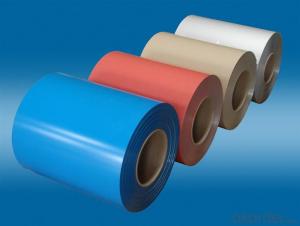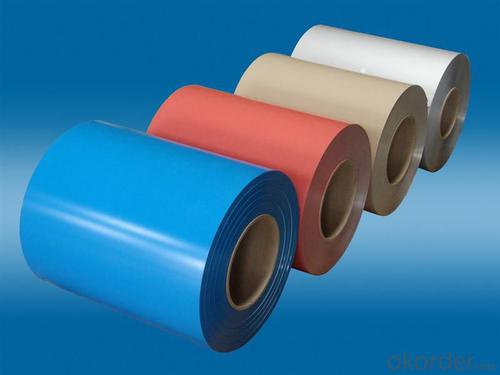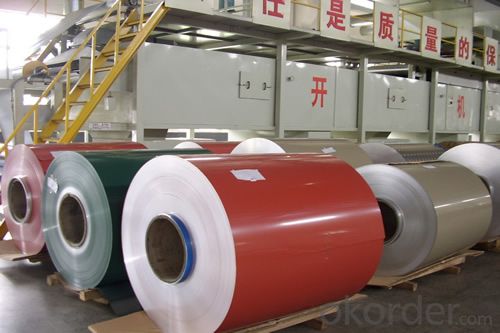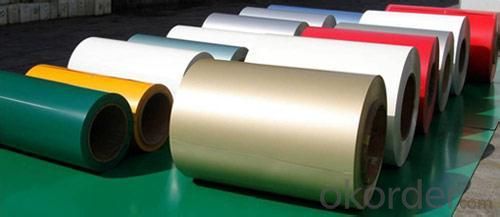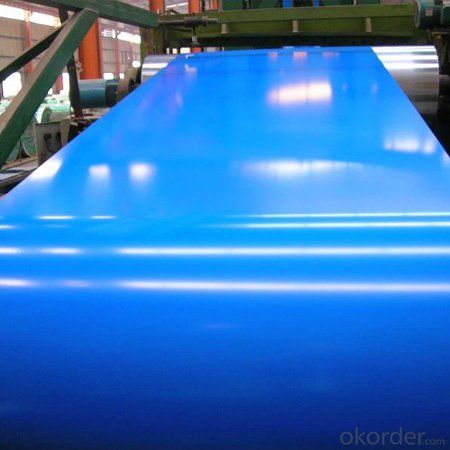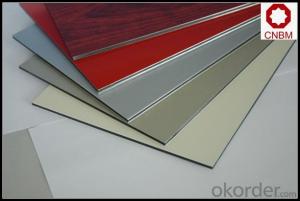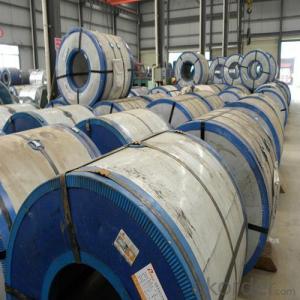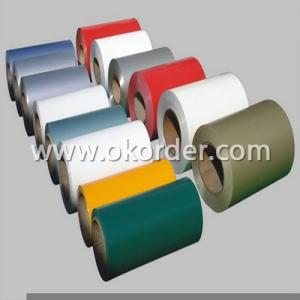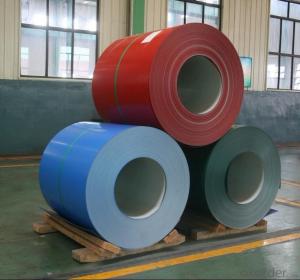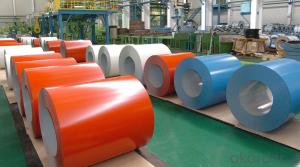Aluminum Coils for Sale - Color Coated Aluminum Coils Manufacturer
- Loading Port:
- Shanghai
- Payment Terms:
- TT OR LC
- Min Order Qty:
- 5 m.t.
- Supply Capability:
- 5000 m.t./month
OKorder Service Pledge
OKorder Financial Service
You Might Also Like
l Product Introduction:
1 | Alloy: | A1100, A1050, A1060,A3003, A3004, A3005, A3105 , A5052, , A5754, A8011 etc. |
2 | Temper: | H14, H16, H18, H24 etc. |
3 | Thickness: | 0.2mm - 2.0mm |
4 | Width: | 15mm - 1600mm |
5 | Color: | chromic,white,metallic and so on(Customized, choose from RAL color chart or refer to customers' counter sample.) |
6 | Coating: | Polyester(mainly),Fluorocarbon(mainly), polyurethane and epoxy coating ect. |
7 | Coating thickness: | PVDF≥25 micron; PE≥18 micron. |
8 | Surface Quality: | be free from Oil Stain, Dent, Inclusion, Scratches, Stain, Oxide Dicoloration, Breaks, Corrosion, Roll Marks, Dirt Streaks and other defect which will interfere with use. |
9 | Mechanical Property: | Chemical Composite and Mechanical Property are meted with GB/T, ASTM, ENAW Standard. |
10 | Interior diameter: | 105mm or 405mm or 505mm |
11 | Coating hardness: | (pencil hardness) more than 2H |
12 | Impact resistance: | no cracking and peeling(≥50kg/cm) |
13 | Flexibility(T-bend) : | ≤ 2T |
14 | MEK resistance: | more than 100 |
18 | Application: | roofs, facade cladding, ceilings, aluminum curtains, composite panels, pipe wrap, advertisement plates, instrument panels, and other uses. |
l Packaging & Delivery
Packaging detail: Standard seaworthy exporting carton, Wooden
pallets, waterproof paper and plastic coverage or or
as customer's requirements
Delivery detail: about 25 days from received oiginal L/C or advance payment
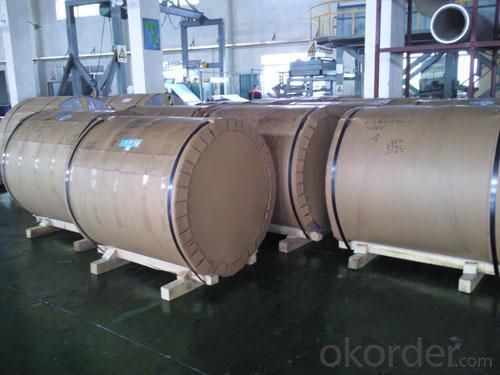
l Company Profile
CNBM International Corporation, China National Building Materials (Group) Corporation, is one of the largest companies in China building material & equipment industry, with 42,800 employees and sales in 2005 of US Dollar 4.395 billion. In 2006, China National Building Material Company Limited was listed on Hong Kong Stock Market with the stock code as 3323.
The business scope of CNBM covers from manufacturing and sales of a series of building materials to scientific research and design, import and export trade. In many of these fields, CNBM is playing the leading role.
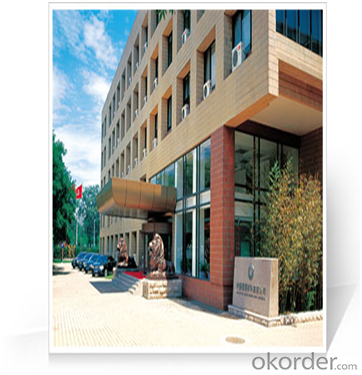
l Product Images
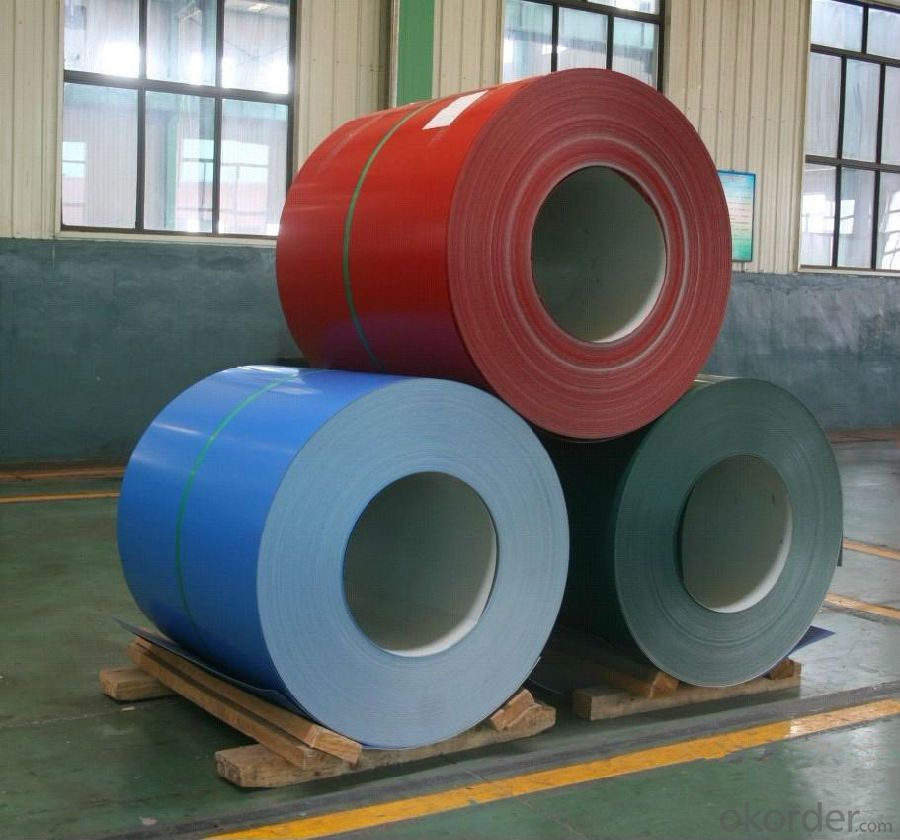
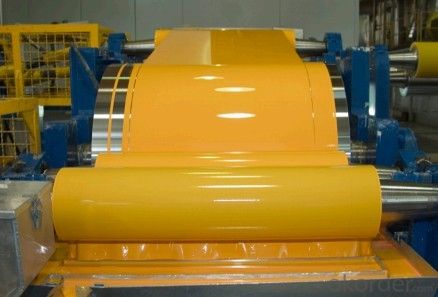
l FAQ
Q: Do you provide free samples?
A: Yes, free samples will be sent to you on freight at destination.
Q: Can I get your latest products catalogue?
A: Yes, it will be sent to you in no time.
Q: What is the MOQ?
A: 5 tons
Q: What are your payment terms?
A: We accept L/C, T/T.
l Contact Us
Email: service@okorder.com
- Q: What is an aluminum coil and what is it used for?
- An aluminum coil is a long, flat, and thin sheet of aluminum that is rolled up into a coil shape. It is typically made from high-quality aluminum alloys that are durable, lightweight, and corrosion-resistant. Aluminum coils have a wide range of applications across various industries. One of the most common uses is in the manufacturing of aluminum products, such as cans, containers, and packaging materials. The flexibility and malleability of aluminum coils make them ideal for shaping into different forms and sizes. Additionally, aluminum coils are extensively used in the construction industry for various purposes. They are commonly used for roofing, siding, gutters, and other exterior applications due to their ability to withstand harsh weather conditions and resist corrosion. The lightweight nature of aluminum coils makes them easier to handle and install, reducing labor and transportation costs. Moreover, aluminum coils are also used in heating, ventilation, and air conditioning (HVAC) systems. They are utilized in the production of condenser and evaporator coils, which are crucial components for controlling temperature and humidity in residential, commercial, and industrial buildings. In summary, an aluminum coil is a versatile and valuable material that finds widespread use in numerous industries. Its lightweight, corrosion-resistant, and malleable properties make it an excellent choice for manufacturing aluminum products, as well as for construction and HVAC applications.
- Q: is Aluminum wrotten with a 2 behnd it?
- No, you're thinking of diatomic molecules like dinitrogen and dihydrogen which come in pairs because forming a covalent bond with another atom fills up their electron shell which is what makes them most stable. Metals don't tend to form covalent bonds in bulk but have a kind of ionic bond. You could search for 'metallic bonding' and I imagine some helpful sites would appear. Basically, the electrons are shared, that's what makes metals conductors of electricity. kind regards
- Q: Can aluminum coils be used for decorative purposes?
- Yes, aluminum coils can be used for decorative purposes. Aluminum is a versatile material that can be easily shaped and manipulated, making it suitable for a wide range of decorative applications. Aluminum coils are often used to create decorative trim, accents, and borders in various industries such as architecture, interior design, and automotive design. They can be painted or coated with different finishes to enhance their visual appeal and match the desired aesthetic. Due to their lightweight nature and durability, aluminum coils are also commonly used for decorative purposes in outdoor settings, such as garden ornaments, sculptures, and signage. Overall, aluminum coils offer a cost-effective and aesthetically pleasing option for incorporating decorative elements into various projects.
- Q: Are there any restrictions on the coil surface quality of aluminum coils?
- Yes, there are restrictions on the coil surface quality of aluminum coils. The surface quality of aluminum coils is important for various applications, including aesthetics and functionality. Common restrictions include limitations on surface defects such as scratches, pits, and stains, as well as restrictions on the presence of oil, grease, or other contaminants. These restrictions ensure that the aluminum coils meet the required quality standards and can be used effectively in different industries.
- Q: I can't figure out what the metabolic role of aluminum is. Been searching for a while and can't seem to find anything concrete.If you can, please include sources. Thanks!
- I okorder /
- Q: What are the potential health risks associated with working with aluminum coils?
- Individuals who work with aluminum coils may face certain health hazards. One of the main concerns is the possibility of being exposed to aluminum dust or fumes. Inhaling these particles can lead to respiratory problems like coughing, difficulty breathing, and symptoms similar to asthma. Prolonged or excessive exposure to aluminum dust can even result in a condition called aluminum pneumoconiosis, which causes lung scarring and impairs breathing. Moreover, aluminum is a substance that is toxic to the nervous system, and prolonged exposure to high levels of aluminum can lead to neurological disorders. Some studies have suggested a potential connection between aluminum exposure and conditions like Alzheimer's disease, although further research is needed to establish a definitive cause-and-effect relationship. Another health risk associated with working with aluminum coils is the possibility of skin irritation. Direct contact with aluminum can cause contact dermatitis, which manifests as redness, itching, and inflammation of the skin. To minimize the risk, it is crucial for workers to take necessary precautions such as wearing protective clothing and gloves. Additionally, working with aluminum coils may involve the use of chemicals like lubricants, solvents, or cleaners, which also pose health risks. These chemicals can cause skin and respiratory irritation, and in some cases, they may lead to long-term health issues such as organ damage or cancer. In conclusion, while there are many advantages to working with aluminum coils, it is vital to be aware of the potential health hazards involved. Employers and workers should take appropriate safety measures, including wearing personal protective equipment, implementing effective ventilation systems, and following best practices to minimize exposure and mitigate any potential health risks. Regular monitoring and medical check-ups are also advisable for individuals regularly exposed to aluminum coils to ensure early detection and prevention of any adverse health effects.
- Q: How do aluminum coils contribute to thermal insulation?
- Aluminum coils contribute to thermal insulation in several ways. Firstly, aluminum is a highly reflective material, meaning it can reflect heat and radiation away from the surface. This property helps to reduce the amount of heat that is absorbed by the coil and transferred to the surrounding environment. Additionally, aluminum coils are often used in conjunction with insulation materials such as foam or fiberglass. These insulating materials help to trap air pockets, which act as a barrier to heat transfer. The aluminum coil serves as a protective layer, preventing the insulation material from being damaged or compromised. Furthermore, aluminum is a lightweight material with excellent corrosion resistance. This allows aluminum coils to be used in various applications, including HVAC systems, where they can help to maintain a consistent temperature by minimizing heat loss or gain. Overall, aluminum coils play a vital role in thermal insulation by reflecting heat, protecting insulation materials, and providing durability and longevity to the insulation system.
- Q: What is the typical coil diameter for aluminum coils?
- The typical coil diameter for aluminum coils can vary depending on the specific application and industry, but it is generally in the range of 12 to 72 inches.
- Q: What are the storage life and shelf life of aluminum coils?
- The storage life and shelf life of aluminum coils can vary depending on various factors such as the storage conditions and the specific type of aluminum alloy used. Generally, aluminum coils have a relatively long storage life and shelf life. In terms of storage life, aluminum coils can be stored for an extended period of time without significant degradation in their quality or performance. However, it is important to store them in a dry and well-ventilated area to prevent corrosion. Moisture can cause oxidation and corrosion, which can affect the integrity and durability of the aluminum coils. As for the shelf life, aluminum coils can remain in good condition and retain their functional properties for an extended period of time when stored properly. The exact shelf life will depend on the specific application and the intended use of the aluminum coils. To ensure the longevity of aluminum coils, it is recommended to follow the manufacturer's guidelines for storage and handling. Additionally, regular inspections and maintenance can help identify any signs of corrosion or damage and take appropriate measures to prevent further deterioration.
- Q: Are aluminum coils suitable for solar panel applications?
- Yes, aluminum coils are suitable for solar panel applications. Aluminum is a lightweight and highly conductive material that has several advantages for solar panels. Firstly, aluminum coils can effectively transfer and dissipate heat, which is crucial for maintaining the efficiency and lifespan of solar panels. Aluminum's excellent thermal conductivity helps in reducing the temperature of the solar cells, preventing overheating and potential damage. Secondly, aluminum coils are highly resistant to corrosion, making them an ideal choice for outdoor solar panel installations. Solar panels are exposed to various weather conditions, including rain, snow, and humidity, which can lead to corrosion and degradation. Aluminum's natural oxide layer acts as a protective barrier, preventing corrosion and increasing the durability of the solar panels. Additionally, aluminum is a cost-effective material that is widely available and easy to manufacture. Its lightweight nature also contributes to easier transportation and installation of solar panels, reducing overall costs. In conclusion, aluminum coils are suitable for solar panel applications due to their excellent thermal conductivity, corrosion resistance, durability, and cost-effectiveness.
Send your message to us
Aluminum Coils for Sale - Color Coated Aluminum Coils Manufacturer
- Loading Port:
- Shanghai
- Payment Terms:
- TT OR LC
- Min Order Qty:
- 5 m.t.
- Supply Capability:
- 5000 m.t./month
OKorder Service Pledge
OKorder Financial Service
Similar products
Hot products
Hot Searches
Related keywords
